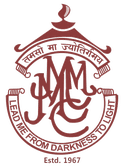MULTANI MAL MODI COLLEGE, PATIALA
Certificate course in Hands on Training of Basic Chemistry Softwares (30 Hours)
PG Department of Chemistry
Post graduate department of chemistry of Multani Mal Modi College, Patiala offers 30 hours Certificate course in hands on training of basic chemistry softwares. This course aimed at imparting skills on use of various open source chemistry tools that are essential for any student or researcher with chemistry as a major subject. At the end of course, the participants will be able to use these softwares for drawing chemical structures, generation of their names, retrieve information about physical properties calculations, three-dimensional molecular structure calculations, spectroscopic signatures, chemical reaction pathways prediction, molecular functional groups, docking sites predictions, and other parameters efficiently.
30 Hours
All B.Sc. final year students having chemistry as major subject and all M.Sc. Chemistry students are eligible
Assessment of candidates will be done through theoretical assignments, projects & practical examinations after completion of each module. All successful candidates will be awarded with certificates.
Module 1 (4 hours)
ACD ChemSketch software: Introduction, download and installation process, Drawing various chemical structures (acyclic, cyclic, polycyclic, heterocyclic), name generation from structures, conversion of name of molecule into its structure, calculation of physical properties such as density, molecular weight, molecular formula, refractive index from structural formula, bond angles, bond lengths, dihedral angles.
Learning outcomes:- After successful completion of this module candidate will be able to use ACD ChemSketch for generation and processing of simple and complex chemical structures.
Module 2 (5 hours)
Cambridge ChemDraw Ultra software Introduction, download and installation process, Drawing various chemical structures (acyclic, cyclic, polycyclic, heterocyclic), nomenclature generation, conversion of name into molecular structure, calculation of physical properties such as density, molecular weight, molecular formula, refractive index from structural formula. 1H, 13C NMR prediction from molecular structure, Drawing structure of bigger molecules such as proteins, carbohydrates, and RNA/DNA, bio arts, use of templates, Comparison of ACD ChemSketch and Cambridge ChemDraw Ultra software.
Learning outcomes:- After successful completion of this module candidate will be able to use Cambridge ChemDraw Ultra for generation, processing and calculation of physical/chemical properties of simple and complex molecules.
Module 3 (8 hours)
Chem3D software:- Introduction, download and installation process, 3D structure of molecules, various 3D structure models, conversion of 2D structure into 3D structure, File extensions, Cartesian coordinates, Dihedral angles, Energy minimization, calculation of surface properties, calculation of molecular electrostatic potential (MEP) surface, electrostatic potential (ESP) surface, solvent accessible surface. Atomic charge calculations, Calculation of dipole moments, MM2 calculations, Huckel calculations, Calculation of UV and IR spectra using MM2 calculations.
Learning outcomes:- After successful completion of this module candidate will be able to study three dimensional properties of molecules which are highly useful in prediction of their chemical/ physical properties and can be applied in advanced research work.
Module 4 (5 hours)
Introduction to online chemical database search, Searching and downloading research papers using keywords in Scopus, Science direct, and google scholar, reaction search, product search, reactant search, structure search, markush search using Sci-finder. Introduction to End Note and its applications.
Learning outcomes:- After successful completion of this module candidate will be able to use online research tools efficiently and will be able to search research papers related to their topics more efficiently.
Module 5 (8 hours)
Chimera 1.12 software:- Introduction to Chimera software, Protein-ligand Docking, Protein data bank structure search, preparation of ligands and proteins for docking, Sites searching for ligand binding analysis, Docking of simple molecules over active site of protein molecules and analysis of docking results.
Learning outcomes:- After successful completion of this module candidate will be able to study drug-receptor interactions through docking. The knowledge of these interactions is a fundamental requirement for modern drug discovery process.
Salient features of certificate course
- Theory and practical session as per curriculum
- Lectures include entire process of downloading and installation of these softwares.
- Hands on training on all these softwares
- At end of course candidate will be able to use these open source software’s independently for their work.
- A certificate will be issued to the successful candidates

